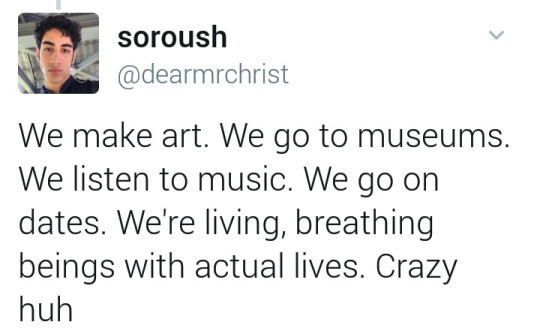Book reviews and writing advice from a reader's perspective.
Don't wanna be here? Send us removal request.
Text
If you see this post, that means my queue is empty.
Since I normally have it filled with at least 10 posts, that probably means I have a hard or stressful time right now. Please be patient, I will do my best and update my queue as soon as possible. If you'd like to, you can of course send me a message that my queue is empty, in case I just forgot it for a longer period of time, or I overestimated its length, or in case I can find some way to update it, and if it's just reblogs - I'd love to give you something, anything. Thank you for understanding ❤️
46 notes
·
View notes
Text
I think this is such an artist problem? Maybe also a young people problem? Do not put yourself down like that. Never. Not even for fun. Instead: Be ironically arrogant. Do not say “yeah, this is garbage, but”, rather say “Of course, this is absolutely going to be the next masterpiece, New York times bestseller, because I am the new George R. R. Martin, J. K. Rowling bows before me”. It’s more fun, you still do not sound like an asshole, because it’s obviously meant ironically, but your brain cannot spot the difference between irony and reality. It will think you actually assure yourself, and it will respond with being more confident. I literally bullshitted myself into being confident that way. It took some time, but your brain can easily be tricked, after all, it’s just a slimey ball of nerves.
Me: Has an intricate plot and world laid out for my WIP, has characters and content I like
Me, trying to explain my WIP to my friends;

#writing#write#writers of tumblr#writblr#writeblr#inspiration#writing inspiration#author#aspiring author#writers on tumblr#writing tip#writing tips#writing motivation#motivation#reassurance#reassuring#confidence
6K notes
·
View notes
Photo
Why is this important for this blog? Because first of all, this should be in every blog, regardless of the usual content. And second of all, it actually fits to my writing content: When you want to write about something, you can’t base your writing on stereotypes and wrong stories.
























This post needs to be shared in all the blogs.
638K notes
·
View notes
Text
Important Questions to know about a Character
I did say before that I am not a fan of advice posts that tell you that you need to know every single little detail about your characters, or your worlds. But there always are some little questions you should be able to answer, of course starting with the general biographic information about your character, but also a bit about their backstory and personality. Those are depending on what kind of story you are writing, and how important your character is in it, but I collected some hopefully helpful inspiration for you to pick and choose and change to your liking.
1. How much does your character love life?
This will be useful to know if your character faces a dangerous situation, and is also handy for their general attitude - optimistic, pessimistic, things like that.
2. What do they value most?
Could be a thing, could be money, could be family, there are a lot of possibilities - if you are interested, check out my post about motivation for more ideas. Important when it comes to decisions.
3. Did they have a teacher or did they teach themselves?
Could be applied to literally any skill, but you should maybe look at it from a broader perspective and think more about a mentor in life versus an abandoned child that had to learn from experience.
4. Where is their breaking point?
Super important. What do you have to do to a character, or take away from them, to break them? The moment you know what it is, put your character in danger of loosing it, and let them fight.
5. At what point would they start to resist? Why? How?
Most of us would endure some sort of uncomfortable situation for a certain amount of time. If you want your character to fight against their situation, you should understand when and why the situation became too much to endure, and how they would resist.
6. Do they work better alone or in teams?
Some people work better alone, some in teams. You should know which one it is, so that you can make interactions with other people more natural.
7. How do they respond to stress / pressure?
Your plot will most likely put your main character under pressure, so you need to know how they respond to it, and how they handle it.
As I said before, all of these are just inspiration. Maybe you do not need to know everything of this for your specific story. Certainly you will need to know more about your character than just the answers to these questions. But it could be a good starting point for you.
#writing#write#writers of tumblr#writblr#writeblr#inspiration#writing inspiration#author#aspiring author#writers on tumblr#writing tip#writing tips#advice#writing advice#character development#character design#character questions#character sheet
43 notes
·
View notes
Text
I said it before, in my post about how the “No-spoilers-culture” is ruining good writing, but I will say it again: There is nothing bad about your writing following logical rules that indicate a specific plot twist, and then actually getting to that plot twist. There is something bad about a drugged up rollercoaster ride where every other moment there is a turn nobody saw that yeets away half the passengers because it simply does not make sense. Yes, I have strong feelings about this topic.
to every writer of every story who has changed a plot twist simply because the audience guessed it, i give you Matthew Mercer:
“It makes me excited that people are following along so closely and are picking up the threads that I’m dropping. It means that I’m not doing a terrible job about laying down the tracks. Sometimes the surprise isn’t the joy of telling a good story, sometimes it’s about rewarding people for following along and figuring it out…you can still add additional twists along the way.”
#writing#write#writers of tumblr#writblr#writeblr#inspiration#writing inspiration#author#aspiring author#writers on tumblr#writing tip#writing tips#spiler#spoilers#foreshadowing#plot#plot twist#surprise#surprises#reblog#reblogs
40K notes
·
View notes
Text
Even if you already did it... Do it again.
Remember, the bike did not re-invent the wheel, it just made it work in a different way than the carriage did.
Hey Hey guys
Don’t worry that your story isn’t original Or that a troupe has been done too many times before Do you know how many soulmate fics I have read?? So many And every time I see a new one I’m just YES MY THING GIMME Or how many boarding school books I’ve bought?? What about fanfiction Some fandoms have hundreds of thousands of fic
There’s thousands of fic on how the same ship will kiss
About the same world. And the same characters. Just with a slightly different spin
Write whatever the heck you want Someone, somewhere, will want to read that self indulgent piece of art, no matter how many times its been done before.
It’s never been done by you
#writing#write#writers of tumblr#writblr#writeblr#inspiration#writing inspiration#author#aspiring author#writers on tumblr#reblog#reblogs#motivation#writing motivation
11K notes
·
View notes
Text
A friendly reminder/tip for new writers
Being rejected sucks. But don’t post about it in anger. Never put an agent or publication on blast. Social media presence matters and complaining about rejections now, especially if you mention names, may cause more in the future.
So keep your head up, build a thick skin, and keep sending out submissions
50 notes
·
View notes
Text
Tat - writing about pain
On the subject of pain, reading a description of pain can bring you in to the story on a deeper level or completely pull you out of the moment.
I’ve had one or two experiences in my life with various types of pain. Here’s some real happenings/differences between various types of wounds.
Scratches- a tear in the skin is usually at the surface level. Bleeding is minimal, A few minutes at worst. Is usually a sharp stinging sensation. If the scratch is made by a dirty object (barbwire or metal covered in mud) it may burn for a short time. When it heals the skin puckers with scabbing and tends to leave tiny, fine scars. These scars tend to fade in a few weeks to few months.
Stab/puncture- depending on how it happens most any type of puncture is a deeper wound, going past the first layer of skin into fats/muscle/possibly bone depending the depth . If it happens with force it will almost always bruise under the actual opening and aches around the wound. If it’s a quick in and out motion perhaps it won’t bruise but it will burn. These wounds bleed freely and require pressure/sutures/medical care to stop. Depending the severity/damage done to surrounding tissue, this will take a week-2 weeks to knit skin together however the tissue inside may continue to ache for weeks because muscle injuries don’t repair easily with/ without medical intervention.
Broken bones- when a bone breaks there’s usually a pop that’s felt and/or possibly a cracking sound. If there isn’t a sound, that doesn’t mean it’s not broken. A break is a severe pain, sharp, tingling, a hot/cold flush from the area. And I hate to break it to my friends in the writing field, when an arm or leg is truly broken (not a splinter/sprain) , people don’t continue to use it afterward, fighting the pain. It’s broken, it literally doesn’t work. Adrenaline might delay the sensory overload of intial pain but usual it’s pretty clear by lumping/swelling/weird angle/lack of support to attached limbs that it’s the real deal. The first outset of pain is intense, the most striking, deepest pain imagaineable. Some people say it burns like an iron. Others have said it feels cold, like a numbing ice that’s burns. Healing from a break itches! Like tear skin off to reach it itchy. Breaks take 2 months to heal, and that’s only if the person doesn’t have any outlying issues like infections / muscle damage etc. physical recovery takes a while after as you teach the muscles around the break to be effective again, muscle atrophy after a break is a real thing.
Shock - going into shock is a serious ordeal for the body that of course depends on the seriousness of the injury that caused it. People say they remember feeling cold afterward usually. Mostly during shock a person is disconnected from what’s happened, borderline catatonic in some cases. They may not be aware of their injuries or seem to care about them. Some cases people faint because they overwhelmed and their brain just shuts down for a time. The time frame is different for everyone. An active warrior type who might be used to blood/gore/pain might shake off shock quickly, a few minutes or so. A regular person not used to pain or intense danger might be in shock for 20 minutes plus or even go into latent shock later after the danger has passed when their brain catches them up to what they survived. Usually this is accompanied by being a little emotional /hysterical , shivering, hyperventilating and not being able to hear/understand other because the part of them used to process new information is preoccupied by this survival instinct.
Happy tat to all. Hope this helps my writer community.
This is amazing! Thank you for putting this together for us!
474 notes
·
View notes
Photo
You know how I am after I read a new book, I have to find fanart of it. And if only to convince you all of reading the book, too.

Just a bit from one of my fav books of the moment, A darker shade of magic (book 1). I’m trying some new stuff, decided to do this one with a more stylised approach. Always thought ADSOM would make a great animated series
https://www.goodreads.com/book/show/22055262-a-darker-shade-of-magic?ac=1&from_search=true
#reading#books#book#booklover#book blog#bookblr#read#read a book#reader#readers#reblog#reblogs#fanart#a darker shade of magic#adsom#shades of magic
8K notes
·
View notes
Text
Handy Websites Seventh Sanctum
Another website of generators! I just love them. Here, we have Seventh Sanctum, a pretty little website with a quite well-structured organisation. From magic abilities to plots for your stories, they give you whatever you need. Where else would I find a generator that tells me I should envision the story of Cain and Abel as a rags-to-riches story?
Find them here: https://www.seventhsanctum.com/index.php
3 notes
·
View notes
Text
How to recover from Post-Inspiration Burnout
What is post Inspiration Burnout?
We’ve all been there. The muses hit us hard, and we spend days, weeks if we’re lucky, churning out thousands of words a day. Our stories are on fire, it’s all we can think about, and if we’re not writing, something feels wrong.
And then it ends, as inspiration always does.
This is normal! Inspiration isn’t a personality trait, it’s a temporary state of being. When that fire burns out, we’re usually left feeling tired and uncreative. So how do we recover?
Why are you slowing down?
First things first, figure out the why. Take a good, hard look not just at your writing, but your life around it. Maybe you don’t know what happens next in the story, and you’re stuck. Maybe you’ve been working a lot of hours and staying up late writing, and you’re physically exhausted. Maybe something emotional happened in your life, like a breakup, or a fight with a friend or loved one. Sometimes it might just be the natural cycle of the muses, but before you chalk it up to that, really look at all the other options.
Some of those causes, like writers block, can be solved by going back to outlines or using brainstorming techniques. Others, like a fight, can only be solved by time. Which brings us to our next question….
Do you need a break?
I always say, if it’s a problem inside your story, you can write around it, write through it, or write about it, but you can’t solve it by not writing. If it’s a problem outside of your story? Then you need to take a honest look at what’s going on in your life to see if you can benefit from a break.
Not everyone needs one in the post-inspiration burnout phase, but plenty do. Let it be an option! Take some time to explore another hobby, another writing project, or to just lay on the couch and watch netflix. Whatever you know is going to help you recover those creative juices.
It helps to choose a start and end date to your break, whether that’s a day or a week or a month, so you can mindfully take time off from your project.
Can you recreate your inspiration?
While you’re reflecting on the reasons you slowed down, and if you should take a break or not, there’s one more thing you should try to figure out: was there something that prompted your inspiration, and if so, can it be recreated? Maybe you moved to a new writing place, and it awakened something. Great! Find another new spot, and see if that helps. Maybe it was a song you listened to over and over and over again until you wrung out all the inspirational juices from it. If it’s on spotify, go to that song’s radio to find other similar jams, or listen to other songs by that artist.
There’s not always a rhyme or reason to inspiration, but if you can find a source, take advantage of that!
Reread for fun
If you find yourself slowing down, give yourself a nice time by rereading all the fevered words you just furiously typed on the page. It’s a good way to spot check yourself to make sure you didn’t just throw out half your outline in a muse-induced haze, and it can bring back some of the excitement you felt when you were writing it. Besides, there’s something about reading words that were written joyously that is just so much fun. Let yourself have a moment.
Don’t hold yourself to the same standard
Were you writing for five hours a night? Were you writing 6k words a day? That’s great, but that’s done now. Don’t expect yourself to be able to sprint forever. Writing is a marathon sport, and there is no shame in physically and mentally slowing it down. If you work well off goals, that’s great, but choose a more realistic word count or time goal for your lifestyle, something that you could conceivably achieve every day, not just when inspiration lights a fire under your ass.
Be proud of what you achieved
Whether your inspiration lasted a day, a week, or months, it’s not something to mourn the loss of; it’s something to celebrate the existence of. Whatever you achieved during this time, be proud of it! Chances are, you wrote words you never would have gotten down without these moments, and had ideas that are going to serve you for much longer than any temporary period of inspiration could ever last. Throw a party!
Remember, no writer writes off of inspiration alone. It takes work, discipline, and some well timed breaks to be a consistent and healthy writer. I hope you enjoy your periods of inspiration, and smile during your periods of work.
#writing#write#writers of tumblr#writblr#writeblr#inspiration#writing inspiration#author#aspiring author#writers on tumblr#writing tip#writing tips#writing advice#advice#motivation#writing motivation
2K notes
·
View notes
Text
As someone who loves biology and thinks about studying immunology later, and also as a writer, this post made me actually tear up.
A Guide to Making Up Diseases (as Explained by a Biologist)
So listen up y’all, nothing drives me crazier as both a writer and a scientist than seeing alien diseases that make no fuckin’ sense in a human body.
If you’re talking about alien diseases in a non-human character, you can ignore all this.
But as far as alien diseases in humans go, please remember:
DISEASE SYMPTOMS ARE AN IMMUNE RESPONSE.
Fever? A response to help your immune cells function faster and more efficiently to destroy invaders.
Sore/scratchy throat? An immune response. Diseases that latch onto the epithelium of the throat (the common cold, the flu) replicate there, and your body is like “uh no fuckin’ thanks” and starts to slough off those cells in order to stop the replication of new virus in its tracks. So when it feels like your throat is dying? guess what it literally is. And the white spots you see with more severe bacterial infections are pus accumulation, which is basically dead white blood cells, and the pus is a nice and disgusting way of getting that shit outta here.
(No one really knows why soreness and malaise happens, but some scientists guess that it’s a byproduct of immune response, and others suspect that it’s your body’s way of telling you to take it easy)
headache? usually sinus pressure (or dehydration, which isn’t an immune response but causes headaches by reducing blood volume and causing a general ruckus in your body, can be an unfortunate side effect of a fever) caused by mucous which is an immune response to flush that nasty viral shit outta your face.
Rashes? an inflammatory response. Your lymphocytes see a thing they don’t like and they’re like “hEY NOW” and release a bunch of chemicals that tell the cells that are supposed to kill it to come do that. Those chemicals cause inflammation, which causes redness, heat, and swelling. They itch because histamine is a bitch.
fatigue? your body is doing a lot–give it a break!
here is a fact:
during the Spanish 1918 Plague, a very strange age group succumbed to the illness. The very young and very old were fine, but people who were seemingly healthy and in the prime of life (young adults) did not survive. This is because that virus triggered an immune response called a cytokine storm, which basically killed everything in sight and caused horrific symptoms like tissue death, vasodilation and bleeding–basically a MASSIVE inflammatory response that lead to organ damage and death. Those with the strongest immune systems took the worst beating by their own immune responses, while those with weaker immune systems were fine.
So when you’re thinking of an alien disease, think through the immune response.
Where does this virus attack? Look up viruses that also attack there and understand what the immune system would do about it.
Understand symptoms that usually travel together–joint pain and fever, for example.
So please, please: no purple and green spotted diseases. No diseases that cause glamorous fainting spells and nothing else. No mystical eye-color/hair-color changing diseases. If you want these things to happen, use magic or some shit or alien physiology, but when it’s humans, it doesn’t make any fuckin’ sense.
This has been a rant and I apologize for that.
#research#writing research#writing resources#reference#writing reference#illness#sickness#disease#diseases#biology#immunology#virus#writing#write#writers of tumblr#writblr#writeblr#inspiration#writing inspiration#author#aspiring author#writers on tumblr#writing tip#writing tips#reblog#reblogs
35K notes
·
View notes
Text

Review A Darker Shade Of Magic (Shades of Magic #1) By V. E. Schwab
Expand to read the Review
After Victoria Schwab already convinced me of her writing style with her Verity City books (read my review of the first one here), I absolutely wanted to read this book, too. And again, she did not disappoint me.
In this fantasy universe, there is not one world, but four of them layered on top of each other, four very different worlds with different relations to magic, but all of them have a city called London at the same spot, and in all of them a monarch is sitting there. Kell, one of the last Antari in the worlds, is able to travel between the Londons, and to deliver messages between the monarchs. The mad King George III in Grey London. The King and Queen that raised him in Red London. The powerhungry Dane siblings in White London. And once, there also was a Black London, but since it was consumed by magic, the other worlds sealed off their doors to save themselves from the fall. Until one day, an artifact from Black London finds its way out...
It was a beautiful read, with a very refreshing take on magic as a tool and danger at the same time. I loved the two main characters, and the moment their storylines intertwined, it got really interesting. The whole plot seems to be thought out so well, and again Victoria Schwab managed to find the perfect balance between killing off too many characters and making their characters seemingly invincible. Also, she left some minor plots open, so that there are enough questions for a part two, which I am very much looking forward to, but not too much, so that you still feel satisfied with the ending. The only thing that bothered me a bit was that she revealed a plot twist that will probably be important in book two a little two early, in a talk between Lila and a healer. I think that could have been made a bit more elegant, in a way so that it would have been more of a surprise when it will be revealed (and I am like 99% sure I am right with my assumption of the plot twist). Still, I really liked the book, and its characters, too, so I will give 5 points, although it took a bit of time to hook me completely. But now that it did, I really cannot wait to get the second part!
I absolutely recommend this book to everyone who loves a good YA adventure fantasy with a sense of wonder to it, who prefers their fantasy a bit darker, but in a way that does not make you want to throw up, and with magic less as a “it’s so cool” thing, and more as a tool to power.
Find it on Goodreads: https://www.goodreads.com/book/show/22055262-a-darker-shade-of-magic
Picture source: http://readeroffictions.com/2014/10/cover-snark-124/
#a darker shade of magic#Victoria Schwab#V E Schwab#V. E. Schwab#shades of magic#5 points#reading#books#book#booklover#book blog#bookblr#read#read a book#reader#readers#review#book review#book reviews#reviews#fantasy#fantasy book#ya fantasy#teen fantasy#teen books#ya books#ya#young adult#young adult fantasy#ya literature
1 note
·
View note
Text
Fanfic Writers Appreciation Day

It’s here again, the day when we try to remember all the names of the people who have touched us with their words and creations and usually end up forgetting someone and feel terrible about it. I know it can’t just be me, right? ;)
So here’s to you, all of you.
Whether you write long fic, short fic, one-shots, poetry, reams of backstory for a character whose story may never actually be written; whether you play out a story in your head and never share it, or blurt out everything that comes to mind to everyone who listens; whether you dominate your fandom with content, or have never shared a single word of your writing; whether you write for canon characters or original characters; whether you agree with canon or Marie Kondo it … you are a writer.
You hold within you entire worlds, quest lines, precious moments with characters that the media will never show us. You may be just starting out, or you may be an old hand at it. Being a new hand does not make your work inferior; being an old hand does not make you an authority on your fandom. At heart, fanfiction is collaborative. Even if you work alone and never show your writing to anyone, you’re still a part of this community, and you’re still deeply appreciated.
When our favorite stories are over, fan creators are what keep them going. Fanfiction writers are a huge part of that. You share your knowledge, your interpretation, of canon characters outside the situations we have seen them in thus far, and through you, we get to know them better, love them better. When you work with artists to create something uniquely fan-made, we get a precious glimpse of the wonders inside not just your mind, but the artist’s mind too.
We live in a world where fanfiction is slowly beginning to be recognized as a genre of its own, but where many of us still feel ashamed to acknowledge our part in it outside the online fandom communities that make us feel at home. Even online, where we should feel safe in our expression, there is a vocal contingent of people trying to shame us for what we write, simply because they don’t like it.
They are wrong.
Archive of Our Own being acknowledged and rewarded with a Hugo is an enormous step forward; the growing number of professional authors who proudly state that they started with fanfiction is wonderful to see.
But at it’s heart, fanfiction is a very personal endeavor.
It isn’t just an expression of love for characters or setting. It isn’t just dressed up pornography, as some people would have the world believe. Fanfiction is a reflection of the people who write it. Speaking for myself, writing fanfiction has helped me through so many dark periods of my life. Being able to express myself through the characters I love, through characters I have created, in situations and settings that may not necessarily be my own … it’s a gift. Fanfiction is a valid tool to cope with trauma and upset - not just for the writer, but for the reader as well. By writing out our traumas and our triumphs, we may be offering a hand to someone who thought they were alone in their struggles, and that is a beautiful thing.
We are a community, regardless of our differing fandoms. Without fanfiction, and the community built into it, I probably wouldn’t be here to write this letter to you all. Fanfiction writers have pulled me out of my deepest, darkest places; have let me know that I am not alone, and that there is no shame in my struggles. I hope that, as a writer myself, I can do the same for others.
So, in spite of the block, the plot bunnies, the ever-increasing army of OCs, the unsolicited criticism from cowards hiding behind anonymous … here I am. And I am saying this out loud.
You are a writer. You are precious to me, and to your fandom and community. You are deeply appreciated, even if it doesn’t always feel that way. Your words would be missed if you stopped.
Happy Fanfic Writers Appreciation, all writers out there.
I’m proud to know you. And thank you.
#writing#write#writers of tumblr#writblr#writeblr#inspiration#writing inspiration#author#aspiring author#writers on tumblr#writing tip#writing tips#motivation#writing motivation#appreciation#fanfiction#fanfictions#ff#reblog#reblogs
546 notes
·
View notes
Text
how to unstick that stuck scene:
- make sure you know how each character feels going into the scene, and how that progresses throughout
-understand what each character wants out of the scene
-understand why you are including this scene in the first place
-check the last scene and make sure it is resolved the way you want it
#writing#write#writers of tumblr#writblr#writeblr#inspiration#writing inspiration#author#aspiring author#writers on tumblr#writing tip#writing tips#writing advice#advice#writers block#reblogs#stuck#scene#reblog
2K notes
·
View notes
Text
Handy Websites Springhole.net
Sometimes, all you need is a good generator. I already gave you a suggestion, but here is one more! On this helpful little website, you can also find tips and writing advice, and also lots of stuff about roleplaying and some quizzes. Sure enough stuff to spend some hours there and try to find inspiration! Check it out!
Find them here: https://www.springhole.net/index.html
2 notes
·
View notes
Text
Why your book isn’t working
So, you’re working on a book, or maybe you’ve finished it. But you know something just isn’t right, or the first readers didn’t like it. What could be the problem?
1. Story not plot
The issue could be that you have written a story and not a plot.
A story is a string of events occurring one after the other. It’s basically: this and then that and then that etc.
Plot is a series of events/occurrences that are interlinked in a cause-and-effect manner. A happened because of X, which resulted in Y.
Oftentimes, the idea for a new WIP comes to us as snippets of happenings that are random. However, that does not a book make.
A book needs plot. Your events need to follow some pattern or logical consequence of cause and effect. One plot point must give rise to another in a structure that makes sense and ensures maximum interest.
There’s a reason there are so many pre-determined plot structures out there.
If your book is just story and not plot, try to outline the events in a more organised way. Maybe you can consult guides like the 3-Act arc or Save the Cat if you need help.
2. Pacing
Maybe you have a structured plot, where each occurrence is logically and entertainingly linked to the rest, but you don’t pace out those events correctly.
Apart from good structure, the most important aspect of plot is pacing.
There is an art to writing good stories, and a lot of that involves good timing. You should not litter big event after big event with no space to breathe. You also shouldn’t write 500 pages of nothing.
It’s a difficult balance, but plotting aids could once again help.
I also have a post on conquering pacing, if you want to check that out.
3. Weak characters
This is a fatal mistake.
If you have flat, one-dimensional characters that do not interest your readers, no amount of plotting will save the book.
I know this comes across as harsh, but it really is true. Character is key.
So, if you have no problems with your plot per se, but something still isn’t working, you might want to review your characters.
Are they three-dimensional enough? Do they have strong, identifiable motivations? Do they have interesting combinations of traits and interests? Are they diverse?
You can check out my post on designing a simple character arc if you feel really stuck.
I would also recommend creating character sheets in which you flesh out each character. Personality tests such as MBTI and Enneagram are also great ways to create complicated characters.
4. Too many overused tropes
Everything has been done before. I’m sorry to break it to you. However, not all variations/combinations of things have been done.
It’s okay for your book to feature a cliche or a popular trope. What might be damaging is using a bunch of overused ideas in one book.
There are some elements, like the “wise old wizard” or “the chosen one” or “the answer was inside you all along” that have become distinctly predictable. This is because most people have seen them a thousand times.
This means that your readers won’t be interested in reading further, since they’ll feel like they already know how things will play out. It’s old and boring. The market for these types of stories is also saturated.
So, make sure that you combine elements of storytelling in a somewhat unique and surprising way. No, you don’t have to set out to write something absolutely revolutionary. There should just be some originality - even if it’s just in your writing style.
5. Messy prose
Sometimes the premise, plot and characters of a book are amazing. But you just can’t enjoy reading it. Why? Because the writing is terrible.
Writing inundated with spelling errors, run-on sentences, boring word-choice etc. is very difficult to find entertaining.
Do not allow your good story to be discarded because of messy prose and grammatical errors.
Grammar, spelling and syntax exist for a reason. They facilitate ease of reading.
So, before you put writing out there, use ProWriting Aid or Grammarly, at the very least. If you’re putting it out in a professional capacity, hire a qualified editor.
You don’t want to be labelled a bad writer because of something that is easy to fix.
There are probably many more reasons something could feel off, but these are some of the main ones. Keep in mind that these problems can be fixed.
Reblog if you found this post useful. Comment with the problems you’ve noticed in writing. Follow me for similar content.
#writing#write#writers of tumblr#writblr#writeblr#inspiration#writing inspiration#author#aspiring author#writers on tumblr#writing tip#writing tips#writing advice#advice#reblog#reblogs
6K notes
·
View notes